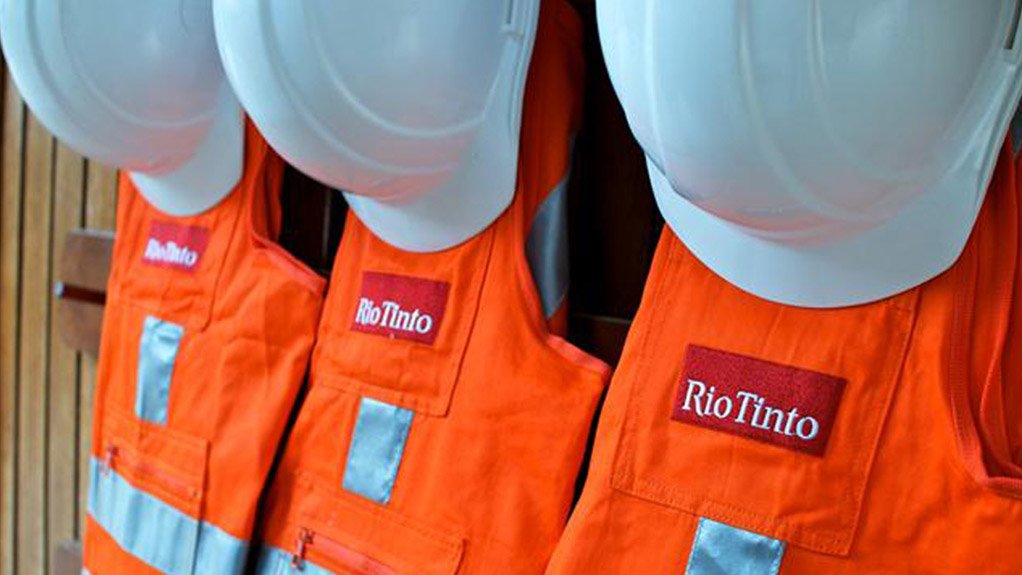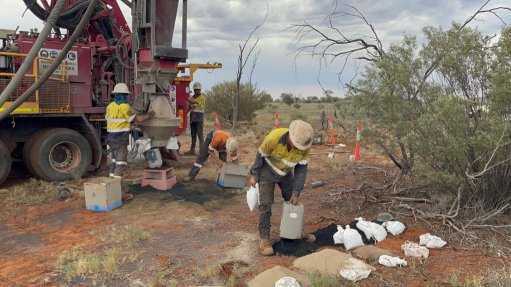Rio reports tough end to the year
PERTH (miningweekly.com) – Diversified major Rio Tinto has seen a drop in production across all of its commodities for the full year ending December, and in the last quarter of the year, compared with the previous corresponding period.
CEO Jakob Stausholm said that in 2021, Rio continued to experience strong demand for its products while operating conditions remained challenging, including owing to prolonged Covid-19 disruptions.
“Despite this, we progressed a number of our projects, including the Pilbara replacement mines, underlining the resilience of the business and the commitment and flexibility of our people, communities and host governments. We are seeing some initial positive results from the implementation of the Rio Tinto Safe Production System, which we will significantly ramp up in 2022, as we continue to work hard to improve our operational performance to become the best operator.
“In the fourth quarter we set a new direction for the company and announced a number of partnerships focused on decarbonising the value chain for our products, including green steel. We also entered into a binding agreement to acquire the Rincon lithium project in Argentina, which is strongly aligned with our strategy. These actions will ensure we continue to deliver attractive returns to shareholders, invest in sustaining and growing our portfolio, and progress our ambition to net-zero carbon emissions."
Rio on Tuesday reported that iron-ore shipments for the three months to December had reached 84.1-million tonnes, down 5% on the previous corresponding period, while production in the quarter declined by 2%, to 84.1-million tonnes. Full-year iron-ore shipments from the Pilbara reached 321.6-million tonnes, down 3% on the previous financial year, while iron-ore production in the full year was down 4%, to 319.7-million tonnes.
The decrease in production was owing to above-average rainfall in the first half of the year, cultural heritage management and delays in growth and brownfield mine replacement tie-in projects.
For 2022, Rio is targeting iron-ore shipments of between 320-million and 335-million tonnes, with the miner saying that Pilbara shipments guidance remains subject to commissioning and ramp-up of new mines and management of cultural heritage, including any impacts from the recent changes to the Aboriginal Heritage Act.
Copper production for the quarter ending December remained unchanged at 132 000 t, while full-year copper production declined by 7%, to 494 999 t. Rio told shareholders that the mined copper production in 2020 decreased owing to lower recoveries and throughput at Escondida as a result of the prolonged impact of Covid-19, partly offset by higher recoveries and grades at Oyu Tolgoi in Mongolia and Kennecott in the US. For 2022, Rio is targeting mined copper production of between 500 000 t and 575 000 t, and refined copper production of between 230 000 t and 290 000 t.
Bauxite production in the fourth quarter was down 2% on the previous corresponding period, to 13.1-million tonnes, and down 3% in the full year, to 54.3-million tonnes, owing to severe wet weather in the first quarter impacting system stability throughout the year, equipment reliability issues and overruns on planned shutdowns at its Pacific operations.
Bauxite production targets of between 54 000 t and 57 000 t have been set for 2022.
Aluminium production in the quarter was also down by 7%, to 757 000 t, and by 1% in the full year to 3.1-million tonnes, owing to reduced capacity at Rio’s Kitimat smelter in British Columbia following the strike which commenced in July 2021. The labour union and employees have reached an agreement with controlled restart in 2022.
Meanwhile, Rio also announced on Tuesday that it was revising the timelines at its Jadar lithium/borate project, in Serbia, as a result of delays in the approval of the exploitation field licence (EFL), which is a prerequisite to publish the environmental impact assessment (EIA) and the start of the consultation process.
Based on current estimates and subject to receiving all relevant approvals, permits and licences, first saleable production is expected to be no earlier than 2027, compared with the previously estimated 2026.
Rio has committed $2.4-billion to the development of the Jadar project, with the mine expected to produce 58 000 t/y of lithium carbonate, 160 000 t/y of boric acid (B2O3 units) and 255 000 t/y of sodium sulphate once in full production, making Rio one of the top ten lithium producers in the world.
Based on this annual production of lithium carbonate, Rio aims, over the expected 40-year life-of-mine, for the operation to produce 2.3-million tonnes of lithium carbonate.
Rio during the quarter also entered into a binding agreement to acquire the Rincon lithium project in Argentina from Rincon Mining for $825-million. Rincon is one of the largest undeveloped lithium brine projects in the world, located in the heart of the lithium triangle in Salta province.
Stausholm said at the time that the acquisition was strongly aligned with Rio’s strategy to prioritise growth capital in commodities that support decarbonisation and to continue to deliver attractive returns to shareholders.
“The Rincon project holds the potential to deliver a significant new supply of battery-grade lithium carbonate, to capture the opportunity offered by the rising demand driven by the global energy transition. It is expected to be a long life, low-cost asset that will continue to build the strength of our Battery Materials portfolio, with our combined lithium assets spanning the US, Europe and South America,” he said.
Article Enquiry
Email Article
Save Article
Feedback
To advertise email advertising@creamermedia.co.za or click here
Announcements
What's On
Subscribe to improve your user experience...
Option 1 (equivalent of R125 a month):
Receive a weekly copy of Creamer Media's Engineering News & Mining Weekly magazine
(print copy for those in South Africa and e-magazine for those outside of South Africa)
Receive daily email newsletters
Access to full search results
Access archive of magazine back copies
Access to Projects in Progress
Access to ONE Research Report of your choice in PDF format
Option 2 (equivalent of R375 a month):
All benefits from Option 1
PLUS
Access to Creamer Media's Research Channel Africa for ALL Research Reports, in PDF format, on various industrial and mining sectors
including Electricity; Water; Energy Transition; Hydrogen; Roads, Rail and Ports; Coal; Gold; Platinum; Battery Metals; etc.
Already a subscriber?
Forgotten your password?
Receive weekly copy of Creamer Media's Engineering News & Mining Weekly magazine (print copy for those in South Africa and e-magazine for those outside of South Africa)
➕
Recieve daily email newsletters
➕
Access to full search results
➕
Access archive of magazine back copies
➕
Access to Projects in Progress
➕
Access to ONE Research Report of your choice in PDF format
RESEARCH CHANNEL AFRICA
R4500 (equivalent of R375 a month)
SUBSCRIBEAll benefits from Option 1
➕
Access to Creamer Media's Research Channel Africa for ALL Research Reports on various industrial and mining sectors, in PDF format, including on:
Electricity
➕
Water
➕
Energy Transition
➕
Hydrogen
➕
Roads, Rail and Ports
➕
Coal
➕
Gold
➕
Platinum
➕
Battery Metals
➕
etc.
Receive all benefits from Option 1 or Option 2 delivered to numerous people at your company
➕
Multiple User names and Passwords for simultaneous log-ins
➕
Intranet integration access to all in your organisation





















